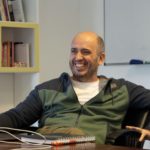Is the future already here?
What about now?
I spend a lot of time thinking about how close the future really is, especially when I see headlines like “Explore the future of work” or “What AI will achieve in 10 years.” Sometimes, it feels like we’re not fully grasping the concept of the future. We tend to view it linearly, when in reality it’s exponential. Understanding exponential growth can be challenging for us humans, but it’s becoming an undeniable part of our reality.
If you want to shape the future, waiting around for the latest trends report isn’t the way to go. You need to hit the ground running, because the future is unfolding every second, and the pace of change is unprecedented. And from my perspective, we need to be proactive if we want to make a real impact.
Don’t get me wrong: acting swiftly and in practical terms doesn’t mean making reckless decisions. Our north star should always be our clear moral compass, rooted in our purpose and values. We’ve seen enough companies lacking a moral orientation often leading to questionable decisions, because at the end of the day very few companies truly possess a purpose that guides them. Some powerful companies have, as we speak, the resources to accelerate the pace of change and reshape what we thought was possible, accelerating timelines of what’s to come.
You might wonder if organizations with different focuses perceive and respond to the future differently. I ponder that too. It seems to me that organizations driven by collective purposes, such as governments, may lag behind those with individual focuses, like businesses. Private organizations are certainly more agile in execution, while public entities often play catch-up, creating regulations after the fact that are doomed to be outdated soon.
I’ve mentioned before that I’ll be establishing a Future Task Force at Arionkoder. It’s important because bringing the future into the present improves our odds of influencing it. The future’s exponential nature isn’t immediate: we have a window of opportunity to gain insight and foresight. I believe that if an event or solution is forecasted for 10 years from now, it’s highly likely that it will come sooner because that prediction is based on our current tools and technology. That’s why Arionkoder’s Task Force will focus less on time horizons and more on understanding the implications and underlying challenges of new events.
Our task force should strive to be futurists, not futurologists, concentrating on the “what” rather than the “when” with a scientific and systematic approach. Drawing on global knowledge exchange, we can tap into bright ideas and talents from diverse sources worldwide. In a world where the possibility of doing things differently has been democratized, I wish for those who, like me, believe the future is already here the strength and courage to make change happen.
